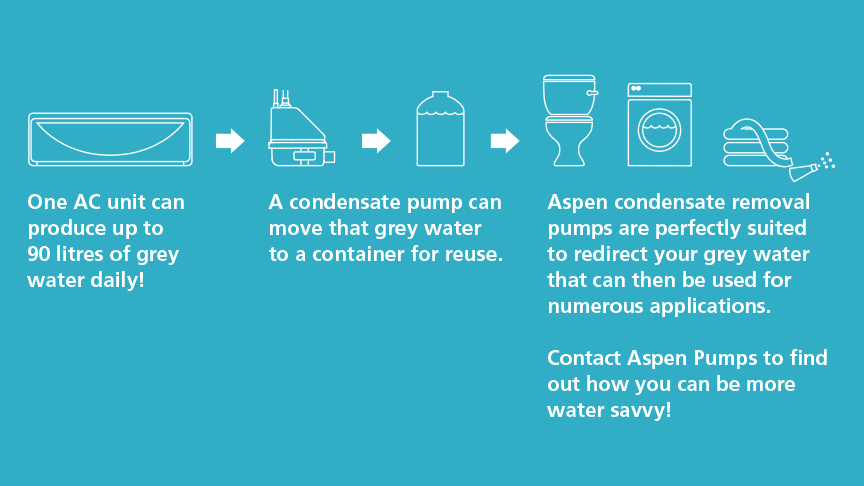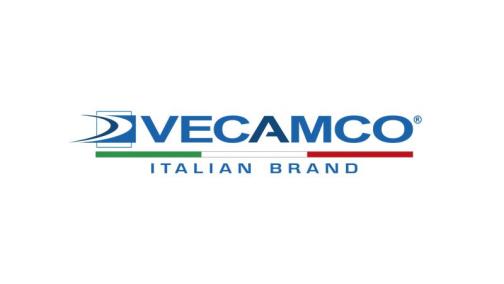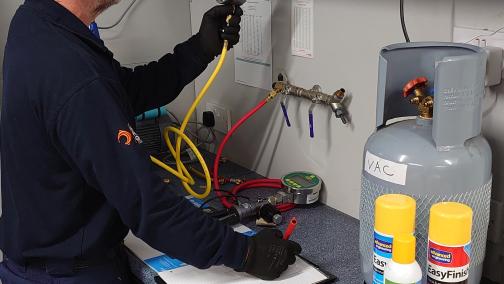
Aspen Pumps Group 27 April 2023
Your air con is a potential source of water conservation

The energy crisis means our short and medium-term focus is very definitely on reducing the fist-biting cost of gas and electricity, so why does conserving water matter?
The energy crisis means our short and medium-term focus is very definitely on reducing the fist-biting cost of gas and electricity, so why does conserving water matter? Waterwise, an independent, not-for-profit NGO focused on reducing water consumption in the UK, says it matters because, if we do nothing, we could be hit by water shortages as early as 2050. Population growth, increasing water use and the effects of climate change are already affecting our future water resources but, if businesses, schools and other organisations, (which use over 24 million litres of water every day,) could reduce their consumption, we all benefit. You don’t have to take big steps either; just tackling the loo is a great start because we flush so much water away. By changing your old-style flush system which uses 9-13 litres for every flush to a dual-flush system, you’ll reduce your water usage to 4-6 litres a flush, saving 12,500 litres per person every year1, that’s the equivalent of 150 average-sized baths each, not that we dare take many of those at the moment.
There’s another way of saving water at your premises that would also improve your ‘Building Research Establishment Environmental Assessment Methodology (BREEAM)’ and ‘Leadership in Energy and Environmental Design (LEED)’ status, and that’s grey water recycling. Grey water is the wastewater from baths, showers, air conditioning units and hand basins and recycling it will result in less mains water consumption, significantly reduced water costs and a lower carbon footprint. Of course this water is contaminated and bacteria will breed unless it’s treated. Treating and recycling grey water on a commercial scale is not a small step and will require investment, but the rewards are clear. Aquaco, world leaders in the design, development and manufacture of water recycling systems, says its recently-installed grey water recycling system at London’s King Cross will recycle 6-9 million litres of water a year, drastically reducing its impact on the environment and the development’s running costs. Buildings with a high supply of grey water like hotels, student accommodation or blocks of flats, would be prime beneficiaries of this kind of system. If this is not feasible, you can have an easy win if you harvest the condensate water from your air conditioning (AC) system and recycle that instead. As unusual as it sounds, condensate water, (which is the moisture that forms when the warm air is cooled by the AC unit) is in abundant supply. On average, 7.4 litres can be produced by a single air conditioning unit operated for eight hours a day2; given that the majority of commercial buildings use AC, that’s a lot of grey water that can be put to good use. And this source is only going to increase because, as the planet hots up, the demand for air conditioning increases. There are currently an estimated 1.9 billion AC units in the world3, and this number’s predicted to almost triple to 5.5 billion units by 20504, so the argument for recycling the AC condensate water is a pretty strong financial and environmental one. And it’s clean too. Although condensate water is not safe for human or animal consumption unless it’s filtered and treated, it’s a reliable source of water for flushing loos, washing cars, clothes and outdoor areas and watering plants, lawns and gardens. But first you have to collect it. In the past this was a challenge as there were few options with gravity drain systems, but the advent of condensate removal pumps has made collection from units more efficient. Aspen Pumps Group has a range of pumps that can lift AC condensate water up to a maximum of 20m into rooftop storage tanks, outside water butts and other water drainage systems, from where the water can then be recycled and reused as appropriate.
Cutting your costs and lowering your carbon footprint are not the only benefits. The UK treasury says that about 70% of the British public want their money to help make a positive difference to people or the planet, and investors are actively engaged in supporting those organisations that can demonstrate their social and environmental credentials. You have probably already introduced carbon-cutting practices in your premises but if recycling the condensate from your ACs units isn’t one of them, what’s keeping you?
Why we need to conserve water
1. Water covers 70% of our planet, but only 3% is fresh water, and two-thirds of that is in frozen glaciers or unavailable for our use.
2. Over one billion people worldwide do not have access to water, and 2.7 billion find water scarce for at least one month of the year.
3. Many of the water systems that feed a growing population are stressed. Rivers, lakes and aquifers are drying up or becoming too polluted to use. Agriculture consumes more water than any other source and wastes much of that through inefficiencies.
4. Climate change is altering patterns of weather and water around the world, causing shortages and droughts in some areas and floods in others.
5. At the current consumption rate it’s estimated that, by 2025, two-thirds of the world’s population may face water shortages.










